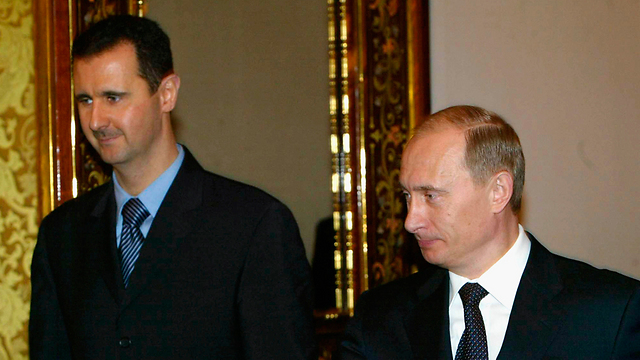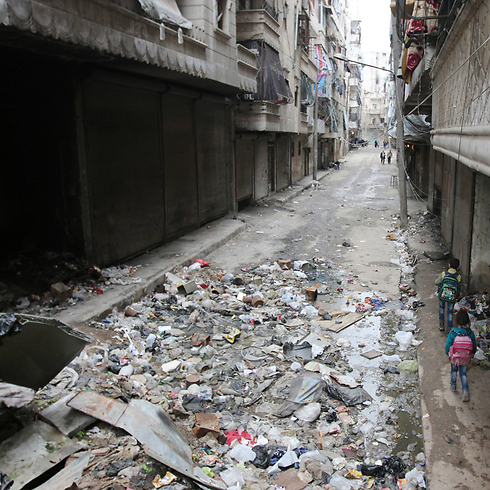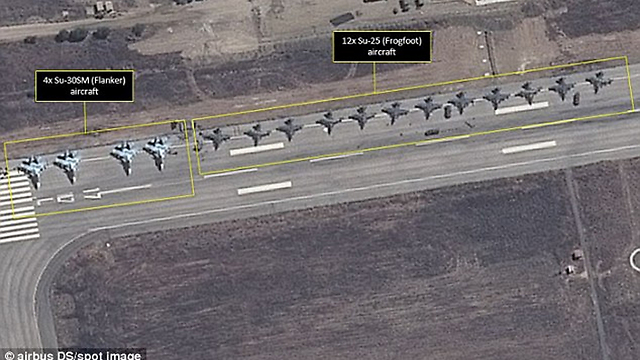
Putin and Assad.
צילום: AFP, EPA
Scaling back in Syria
Op-ed: While Russia is significantly reducing its presence in Syria, Putin has no intention of backing out completely: Moscow will retain control of its strategic assets in the divided country, and a good deal of its influence as well.
When Russian President Vladimir Putin dropped his Middle-East changing bomb on Monday, he made sure to point out what he left for himself. Yes, he'll start scaling down the Russian military's presence in Syria starting Tuesday morning, but he'll still keep hold of the Tartus port, his country's only naval base in the area. He'll also still have the airport at Hmeymim and the Air Force base in Latakia. A retreat, yes, but one that preserves strategic assets.

Putin has conducted business in Syria without much sentiment towards Bashar Assad. The Kremlin profilers have recently described the Syrian President as an illegitimate, weak, tired, and stressed leader. After all, Russia has been the one holding the reins in his fragmented country for the past six months, and didn't do it for Assad's benefit, but in order to protect Moscow's strategic interests.

Putin and Assad. The retreat comes at a bad time for the Syrian president. (Photo: Getty Images) (צילום: gettyimages)
Even if Syria were to change its face and Assad were to disappear, Russia isn't planning on letting go of its assets, which could extend its reach into every corner of the Middle East.
It's important to take note of the meeting held in Amman this week, with fairly little press attention, between Russian Foreign Minister Sergey Lavrov and US Secretary of State John Kerry. Even though Washington claimed on Monday that the government did not know about the Russian retreat in advance, there are those who claim that Moscow gave Washington an update about the decision, which led the White House to issue optimistic statements regarding the Geneva talks between the Syrian government and opposition representatives.
However, the talks are of little consequence. It's hard to believe the two sides will be able to stitch together a deal. The power in Syria will still reside in the hands of the Russian President and his aids, with Obama keeping his distance.
Putin doesn't care if Syria eventually becomes a federation that consists of three cantons. Russia intends to keep "Alawitestan" (the part of Syria run by Assad, who is an Alawite Muslim), the axis that connects Damascus with the shoreline in the north. What happens in the Kurdish region or the Golan Heights will be Hezbollah's purview, without Russia there to stabilize things.
Assad gave a weak, mumbling response on Monday. As far as he's concerned, the decision comes at a particularly bad time: The Russian forces' entry into Syria at the end of September coincided with the retreat of the Iranian Revolutionary Guard, Assad's allies, which returned to Tehran and left Hezbollah alone on the field of battle. However, now that he hears the complaints in Beirut's Dahiyeh district, Assad knows he can't trust Nasrallah's men fully.
It's interesting to see if Assad will be able to convince Qasem Soleimani, commander of the Revolutionary Guard's elite Quds Force, to return his men to the region. In addition, it's unclear whether Tehran will issue a command to Hezbollah, ordering a reinforcement of the Syrian regime, or what the heads of ISIS and Jabhat al-Nusra have in mind.
According to Putin the Russian forces have achieved all of their goals in Syria. What he's really saying is that Russia is tired of confronting ISIS and paying a price for his clashes with Jabhat al-Nusra, which is the local al-Qaeda franchise. Putin, who follow's Obama's passive conduct, has also reached the conclusion that the bleeding mud of the war in Syria, which is going nowhere, could cost him politically at home.
In any case, even if many fighters are packing up and moving out – the Russians aren't leaving Syria. They're just scaling down.












